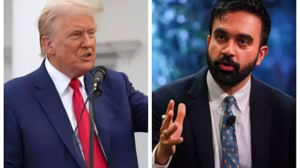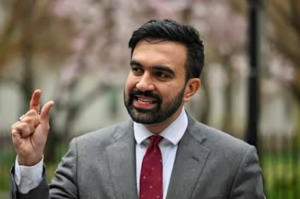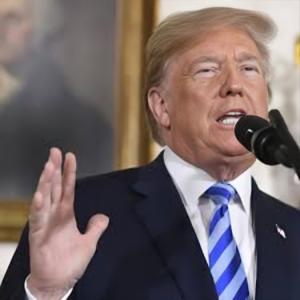Trump’s Bold Warning: New York City Funding at Stake if Mamdani Doesn’t “Behave”
Introduction
In a dramatic turn of political rhetoric, former President Donald Trump has issued a stern warning to New York City: federal funding could be slashed if City Comptroller Shahana Mamdani “doesn’t behave.” This statement not only underscores the escalating tensions between Trump and New York’s municipal leadership but also raises important questions about the interplay between federal influence and local governance. Through this article, we’ll explore the context behind Trump’s warning, its potential impact on NYC’s budget, and what it means for the future of city-federal relations.

Political Context and Background
Former President Trump’s relationship with New York City has long been fraught with legal battles, media spats, and policy disagreements. His latest salvo targets Comptroller Mamdani, who has been vocal in her criticisms of Trump’s post-presidential activities and legal strategies. The comptroller’s role includes auditing city agencies, managing public pensions, and ensuring financial accountability. Trump’s warning suggests he could leverage federal funding as a bargaining chip—an unprecedented move given the separation of city and federal budgets.
- Legal Tensions: Trump faces multiple lawsuits in New York courts, and Mamdani has supported city efforts to investigate alleged financial misconduct.
- Public Discourse: City leaders have publicly criticized Trump’s rhetoric as a threat to democratic norms.
- Fiscal Stakes: NYC relies on billions in federal grants for infrastructure, education, and social services each year.
How Federal Funding Works for New York City
Understanding the mechanics of federal funding helps clarify Trump’s threat. The city receives federal dollars through grants and formula-based allocations:
- Discretionary Grants: Awarded competitively for specific projects (e.g., transit improvements, housing).
- Entitlement Programs: Based on formulas, covering Medicaid, education, and nutrition assistance.
- Emergency Relief Funds: Deployed during crises such as natural disasters or pandemics.
A reduction in any of these streams could force the city to cut programs or increase local taxes. City officials have historically protected these funds through bipartisan advocacy, making any attempt to weaponize them politically both rare and controversial.
Potential Impacts on NYC’s Budget
If Trump follows through on cutting funds, the financial implications could be severe:
- Education: Loss of federal Title I funds would impact schools serving low‑income students.
- Public Safety: Grants for community policing and emergency response could shrink.
- Healthcare: Medicaid shortfalls could increase pressure on city hospitals and clinics.
- Infrastructure: Projects like subway repairs and bridge maintenance might stall without federal grants.
City Comptroller Mamdani has the authority to reallocate existing resources, but her capacity to backfill multi‑billion‑dollar shortfalls is limited without new revenue sources.
Responses from New York Leadership
Mayor’s Office, City Council, and state officials have swiftly condemned Trump’s warning:
- Mayor’s Statement: “Weaponizing federal funds for political retaliation sets a dangerous precedent.”
- Council Resolution: A bipartisan resolution calling on federal authorities to respect the separation of powers.
- State Pushback: New York’s congressional delegation has signaled plans to introduce legislation protecting municipal funding from political interference.
Real‑World Example: 2020 CARES Act vs. Political Pressure
During the COVID‑19 pandemic, the CARES Act provided over $4 billion to New York City for testing, tracing, and economic relief. Despite intense public scrutiny of federal responses, city leaders successfully secured and deployed funds with little partisan obstruction. Trump’s current threat stands in stark contrast to that cooperative effort, highlighting how political dynamics can shift the tug‑of‑war over critical resources.
What’s Next for City‑Federal Relations?
The coming weeks will likely see:
- Legal Challenges: NYC may file suit if federal agencies attempt to withhold allocated funds.
- Congressional Hearings: Lawmakers could call federal officials to testify on funding decisions.
- Public Mobilization: Community groups and unions may rally to defend city budgets.
Regardless of the outcome, Trump’s warning underscores the fragility of intergovernmental partnerships when partisan tensions run high.
Conclusion
Trump’s threat to cut New York City’s federal funds if Comptroller Mamdani “doesn’t behave” represents a dramatic escalation in political brinkmanship. While the legal and constitutional barriers to such cuts are significant, the rhetoric alone has already fueled a fierce debate about the limits of federal leverage over local governance. As New Yorkers brace for potential budgetary impacts, the broader lesson is clear: safeguarding public services from partisan gamesmanship is vital to maintaining trust in democratic institutions.

